#Dr. Meghna
Text

By: Dorey Scheimer, Meghna Chakrabarti and Tim Skoog
Published: May 8, 2024
Puberty blockers and hormones are sometimes used to help gender-distressed children.
But a new groundbreaking review from the UK says the science behind that practice is far from settled.
"The studies that the team looked at, well the quality was disappointingly poor, none of them really effectively reproduced results in seeing improvements in mental health," Dr. Hilary Cass, the review's author, said.
Today, On Point: Dr. Hilary Cass gives her first U.S. broadcast interview.
--
PART I
MEGHNA CHAKRABARTI: In April, a long-awaited report from Britain's National Health Service concluded that for most gender-distressed young people, quote, "A medical pathway will not be the best way to manage their distress," end quote. That is the result of an almost four-year long, 388-page systematic review of all available studies on the use of puberty blockers and cross sex hormones in adolescents.
The report is called the "Cass Review: An independent review of gender identity services for children and young people." It was commissioned by Britain's National Health Service, and it found that the evidence base for medicalized treatment of adolescent gender distress was quote, "Inadequate and poor."
This comes as the number of young people seeking clinical help for gender distress continues to grow. And unlike a decade or two ago, most of these people are adolescent natal girls. Many often suffer from concurrent mental health issues or autism. Dr. Hilary Cass led the review. She's one of the UK's most respected pediatricians and former chair of the British Academy of Childhood Disability and former president of the Royal College of Pediatricians and Child Health.
She granted On Point her first U.S. broadcast interview. You'll hear responses from American clinicians later in the show. But first, to the Cass interview. I began by asking Dr. Cass to describe what her team's review found regarding the quality of medical evidence for using puberty blockers in gender-distressed young people.
HILARY CASS: The quality was disappointingly poor. One of the significant reasons is that they just didn't follow up for long enough, particularly for young people who were taking masculinizing and feminizing hormones. Another problem is that many of the studies didn't take account of the fact that this is a really, what we call heterogeneous, so a mixed population of young people who were very different from each other.
And that population has changed in recent years, from predominantly birth registered boys presenting quite early, to predominantly birth registered girls presenting in the teenage years. Now, within that group are young people with autism, there are young people who may have other complex mental health issues.
There are young people who may have had a series of traumatic events in early childhood. So you can't take the results of how somebody does if they are presenting as a child, and have had consistent long-term gender incongruence from say, when they were four or five. They may not have the same response to medication as somebody who is presenting considerably later.
So you can't put all of these young people into the same treatment group and say they're all going to respond in exactly the same way to this kind of approach.
CHAKRABARTI: Okay. So more specifically then, in the systematic review of studies relating to the use of puberty blockers. We should say that puberty blockers do have quite a well-established evidence base for use in some situations, right?
For example, children with precocious puberty, so they are an accepted treatment for certain things.
CASS: Absolutely right, but it's really important to say that it's a very different thing to take a young person whose hormones are going through the normal increases that you expect to see in puberty. And pausing that. Because during puberty, all sorts of things are going on. Your brain is developing very rapidly. You're developing what's called your executive functioning, which is how you do some complex problem solving, complex judgment abilities, and you're also developing your sexuality. And we just don't know what happens if you put brakes on all of that.
CHAKRABARTI: Specifically, in the review report, there's a discussion that there are claims, actually from quite well-respected bodies, including here in the United States, that providing puberty blockers as a form of treatment and care for gender questioning youth, they're prescribed as treatment because they can alleviate gender dysphoria, they can improve mental health of young people who are genuinely suffering.
Did the review find an evidence base for those goals or aims?
CASS: Okay, so that's a really important question. And the Dutch found that there were some improvements in mental health of those young people, but it didn't affect the dysphoria. In the UK, we attempted to reproduce that using exactly the same approaches as the Dutch.
And disappointingly, the team did not find improvements in mental health. In fact, some young people got worse, some made no changes. And that's the sort of result you might expect from a treatment that's not particularly effective for those outcomes. There may be a group of young people who do have early gender incongruence, for whom this might be the right treatment, particularly that group of birth registered boys who will develop irreversible changes of male puberty.
But just to go back to the systematic reviews, the other studies that the team looked at, none of them really effectively reproduced the Dutch results of seeing robust improvements in mental health.
CHAKRABARTI: To be clear, the report states, quote, that the University of York concluded, and that's the group that did the review.
CASS: That's right.
CHAKRABARTI: That there is insufficient or inconsistent evidence about the effects of puberty suppression on psychological or psychosocial health.
CASS: Correct. And we also have to think about which young people have been receiving puberty blockers, because certainly in the UK, as time has gone on, the young people who were most likely to receive puberty blockers are most commonly aged around 15.
And by 15, obviously, you've gone through most of puberty. So instead of really thinking, okay, how are we going to manage the distress that these young people are feeling? Somehow, we've got locked into puberty blockers as the totemic treatment that young people feel. If they don't get onto puberty blockers, they're not going to get onto a medical pathway.
But actually, there are many different ways in which we can manage distress and anxiety in a 15-year-old that don't involve puberty blockers. And yet we've somehow stopped short of trying those, just because puberty blockers have become so widely believed to be effective.
CHAKRABARTI: This is a really important point that's been brought up by the Cass Review. About did the focus on trying to provide medical forms of therapy perhaps overshadow other forms of care.
CASS: Yes.
CHAKRABARTI: So I want to read to you this is from 2022. And this is from the United States Department of Health and Human Services Office of Population Affairs, and they stated that, quote, "Research demonstrates that gender-affirming care improves the mental health and overall well-being of gender diverse children and adolescents," end quote.
Now I should say that they're speaking about gender-affirming care overall and not just exclusively medical treatments. But there's a gap there, though, between what seems to be the conclusions of the Cass Review vs. that statement, which is not uncommon from the United States.
CASS: We spoke to young adults directly through the review, and we also had some qualitative research, so some researchers talking to young adults, as well.
And one of the things that they said is, I wish I'd known when I was younger that there were more ways of being trans or expressing my identity than just a binary medical pathway. And so a lot of what the focus of our review has been on is saying, what do we do to help these young people to thrive?
And how do we give them the widest range of options that also don't foreclose for them?
CHAKRABARTI: I just want to recap. So the systematic review found that there's insufficient evidence, or inconclusive evidence, about the effect of puberty blockers on mental and psychosocial health or in the alleviation of gender dysphoria.
There's also the question of, there have been competing claims about whether puberty blockers have negative impact on a young person's bone health.
CASS: Again, those results were inconclusive, and we need to follow people up for much, much longer.
CHAKRABARTI: So, Dr. Cass, one thing that the review notes very clearly at the top is the rapid rise, and actually the exponential rise, in the number of young people, adolescents, in particular, seeking treatment for gender dysphoria.
In fact, you have a chart here that shows that around 2013, 2014, every year, essentially, the numbers spike up higher and it's more, many more adolescent girls. What do you think, or what did the review seem to find in terms of what may be driving that rapid rise?
CASS: That's a really good question.
So we looked at what we understand about the biology, but obviously, biology hasn't changed suddenly in the last 10 years. So then we tried to look at what has changed? And one is the overall mental health of teenage girls in particular, although boys, to some degree. And that may also be driven by social media, by early exposure to pornography and a whole series of other factors that are happening for girls.
It's a tough time to grow up. But secondly, a much more fluid approach to how young people see gender. They see gender much more flexibly than, say, my generation did. So for some young people, gender becomes the main anxiety for them and the way in which they focus their distress. And just as an example, a colleague of mine described a not infrequent sequence of events. Which is a young person comes to clinic, a birth registered female is identifying as male.
And the gender is massive for them. The first thing she may do for that young person is put them on the pill to stop their periods. That's a much more straightforward intervention than puberty blockers. If she's binding her breasts, it's really important that she does it safely. So the nurse in the clinic will show her how to do that safely.
And then often, by the next visit, the distress, the anxiety just ramps down. And the next time they see her, it's not that the dysphoria has gone away, but it's just slipped into the background. And then they can talk about whatever the other things are that are bothering them, which might be sexuality.
It might be an eating disorder. It might be anything else. And over time, they may go on to have a trans identity, or they may decide that the issue was around their sexuality or a series of other issues. Sometimes it just resolves, and they stop seeing all of their distress through that gender lens.
PART II
CHAKRABARTI: You're back with On Point. Let's now continue my conversation with Dr. Hilary Cass.
About cross sex hormones, again, because I'm very focused on understanding the evidence base, right? Or lack thereof.
CASS: Sure.
CHAKRABARTI: Regarding cross sex hormones, the systematic review authors said there is a lack of high-quality research assessing the actual outcomes of cross sex hormones.
CASS: Yes, because we need to follow up for much longer than a year or two to know if you continue to thrive on those hormones in the longer term. And we also need to know, are those young people in relationships? Are they getting out of the house? Are they in employment? Do they have a satisfactory sex life?
What are the things that matter to them, and are they achieving those things?
CHAKRABARTI: So once again, the answer is, we don't know. There's insufficient evidence or poor-quality studies, which aren't enough to make informed guidelines for families and practitioners.
CASS: That's right.
CHAKRABARTI: By the time young people are seeking out help for gender dysphoria, they are quite distressed, right?
And as the report says, "It is well established that children and young people with gender dysphoria are at increased risk of suicide." But then the report adds this, "But suicide risk appears to be comparable to other young people with a similar range of mental health challenges." So first of all, what's the evidence for that?
And why is that important to understand?
CASS: So how do we know if this is down to the gender-related distress? Or is it because they also have an eating disorder, or they're depressed or a whole raft of other issues? And because a majority of these young people have all of these issues, then what you need to do is compare to what the population rates are of suicidality in young people who have all of those other issues, but are not gender questioning.
And that's where you find that the rates are fairly comparable. So we can't say that it is the gender questioning or the gender incongruence that's giving you additional suicide risk. And so the second part is, does the gender-affirming treatment pathway reduce that suicidality? But such data as we have shows that we can't detect a difference in the suicide rates before and after treatment.
CHAKRABARTI: So the systematic review then though really combed over all of the studies essentially that are cited when people say that gender-affirming treatment helps save lives. That's not an overstatement on my part. Because Admiral Rachel Levine, who is the Assistant Secretary of Health and Human Services in the United States, in fact, has said that gender-affirming care is, quote, "Quite literally suicide prevention care."
So I'm sure you've heard similar things in the UK, but the review concluded that in a majority of studies that looked at a reduction in suicidality, the studies report that there was a reduction, but there were problems with those studies in terms of they didn't control for the presence of those psychiatric comorbidities that you talked about. And then there was another study that showed that suicidality and self-harm decreased, but out of the 109 eligible participants, only 11 of them had actually completed the questionnaire on suicidality and self-harm.
CASS: What is the important practical issue here? And that is that we have to provide holistic care for these young people.
And what we need to try and do is pick out young people who we think are at risk and say, what are all the things we need to get in place to support this young person's risk? It may be helping with their eating disorder. It may be that they are in difficult family circumstances. There's a whole raft of things that we may need to think about.
And it's much more important to say on an individual basis, how do we manage this person's risk, than just assuming that gender-affirming care is going to be the answer.
CHAKRABARTI: So Dr. Cass, this brings us back to where we began. And that is, you and the independent review team undertook the world's largest systematic review of all of the evidence and studies related to care for gender dysphoric or gender-questioning young people.
It's interesting to me that the world's largest and most influential body that provides guidance for trans care, the World Professional Association for Transgender Health, or WPATH, in their most recent standards of care document, they said that the number of studies is still low and there are few outcome studies that follow youth into adulthood.
Therefore, a systematic review regarding outcomes of treatment in adolescence is not possible. Yet, is that not what the Cass Review did? A systematic review?
CASS: Yes, and actually, so did WPATH. So WPATH commissioned a systematic review from John Hopkins, which is obviously one of the most credible organizations in the U.S., but then they didn't refer to that in the youth part of their guidance. And that was one of the reasons that when our team rated the various guidelines, they rated the WPATH guidelines relatively poorly in terms of the rigor of their development process. Because there were points within the chapter on children and youth where the WPATH team suggested that there was strong evidence and there wasn't.
CHAKRABARTI: They do conclude that the evolving science has shown clinical benefit for transgender youth and then they cite three different studies that they claim supports the assertion of clinical benefit, but the Cass Review points out that one of those studies cited was that original Dutch protocol that we talked about, that deals with a completely different cohort of young people.
Then there's another study that had a one year follow up showing actually very modest changes for young people. And also, I think your team thought the study was too low quality and didn't even include it in your review. And then, most remarkably, the third study that WPATH cites is one that the Cass Review said is a study protocol and does not even include any results.
CASS: Yes, so you have read this extremely carefully, probably better than most of the UK commentators. I think the problem is that there has been an echo chamber of guidelines. So one of the things that the York team did was they looked at where guidelines had followed each other, and they found that most of the guidelines, there was a circularity between the Endocrine Society, WPATH, and a series of other guidelines.
CHAKRABARTI: Dr. Cass, I just want to quote some of the criticisms that have been made of the report. For example, the World Professional Association for Transgender Health that we just mentioned, they issued an email statement saying the report is, quote, "Rooted in the false premise that non-medical alternatives to care will result in less adolescent distress."
And they criticized some of the recommendations from the report, which they claim would, quote, "Severely restrict access to physical health care for gender-questioning young people." Your response to that?
CASS: So we've not taken a position that any form of care is best, but what we have said is that it is important that all young people get access to evidence-based, non-medical interventions that address the full range of their difficulties.
So this group of young people, if they are depressed, if they're anxious, if they need an autism diagnosis, all of those things should be put in place. We don't know which young people may benefit from medical care. And we have proposed that every young person who walks through the door should be included in some kind of proper research protocol so that we can follow them up and we can get those answers over time. So that we don't continue in this black hole of not knowing what's best.
CHAKRABARTI: So Dr. Cass, I just have two more questions for you. You write in the report that gender-questioning young people have been failed by the medical establishment, by the NHS in England. In order to recover from that failure. What does the report recommend change for the treatment of young people?
CASS: I think first and foremost, seeing them as a young person and not as somebody who is gender-questioning, or with a gender problem or a gender issue, they are a young person first. And I think one problem has been just seeing them through a gender lens.
I think we need to re empower professionals to not be afraid. And in the long term, I think if young people could walk through the same door, that doesn't have to be labeled gender. But is a clinic for young people to talk about a range of issues, whether it's their mental health, their sexual health, their sexuality and their gender.
And they could see somebody who would really see them as a whole person, then I think they would get a much better deal.
CHAKRABARTI: Dr. Cass, I just would like to read the last sentence of the review. You write, quote, "I am aware that this report would generate much discussion, and that strongly held views will be expressed. While open and constructive debate is needed, I would urge everybody to remember the children and young people trying to live their lives, and the families and carers and clinicians doing their best to support them. All should be treated with compassion and respect."
CHAKRABARTI: For those children and families and clinicians listening to this interview now, Dr. Cass, what would you tell them? What thought would you leave them with?
CASS: I think the most important thing is keep your options open. I'd say what some of the young adults said, it's not as urgent as it feels. Take your time. Think about all the possibilities open to you. Talk to other young people, but try not to rush.
CHAKRABARTI: Dr. Hilary Cass, she led the team that recently published the independent review of gender identity services for children and young people. It's a massive report that was published at the behest of the National Health Services in England. Dr. Cass, thank you so much for joining us.
CASS: Thank you.
#Meghna Chakrabarti#Dr. Hilary Cass#Hilary Cass#Cass report#Cass review#gender affirming care#gender affirming healthcare#medical scandal#medical malpractice#medical corruption#gender affirmation#puberty blockers#wrong sex hormones#cross sex hormones#evidence based medicine#religion is a mental illness
0 notes
Text
Looking out the window to see if pigs are flying.
oh my fucking god.
For the first time that I know of, an NPR program is interviewing Dr. Hilary Cass about the Cass Review.
This is fucking unbelievable. Up to this point I've never heard anything on National Public Radio that questioned anything trans related.
On Point with Meghna Chakrabarti.
You can listen to it here.
Unfortunately, they're also interviewing people who've been supporting trans insanity. "Both sides," I assume. Funny how they never had "both sides" all the years they've been promoting sterilization and mutilation of children. ;-(
85 notes
·
View notes
Text
Shri Venkateshwara University marked Anti-Tobacco Day by organizing a seminar & awareness rally highlighting the harmful effects of tobacco consumption
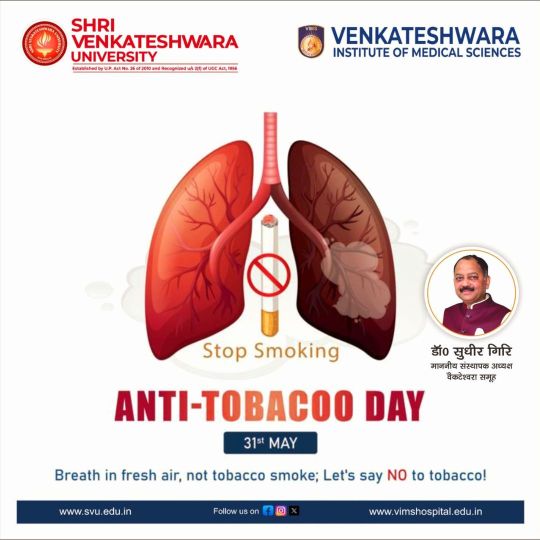
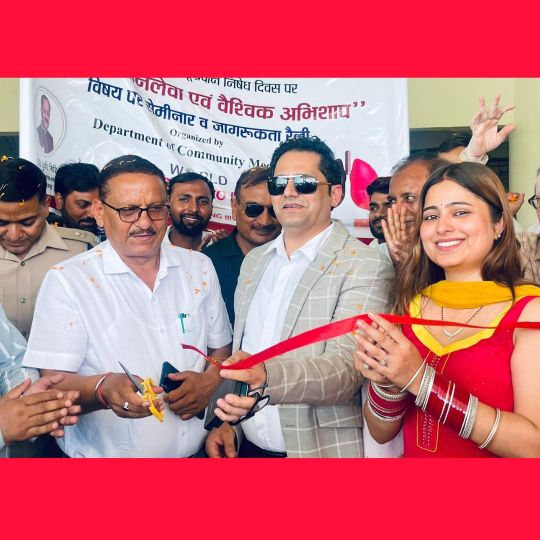
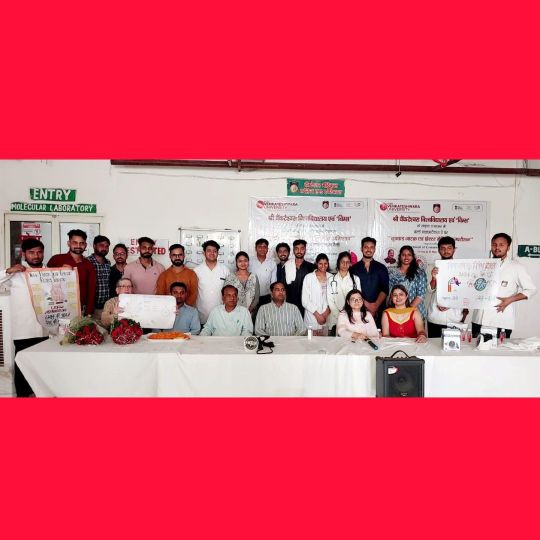

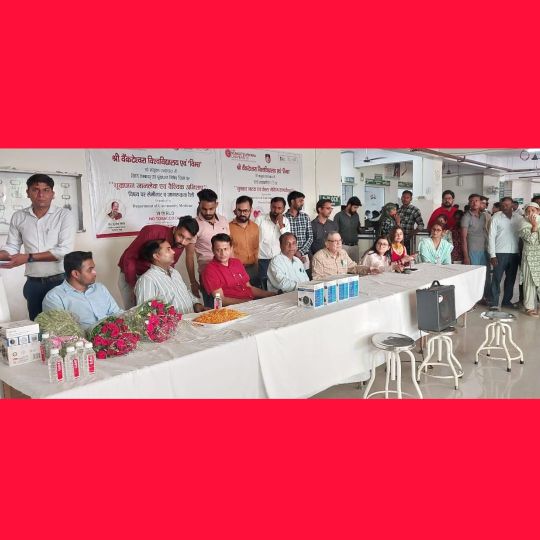

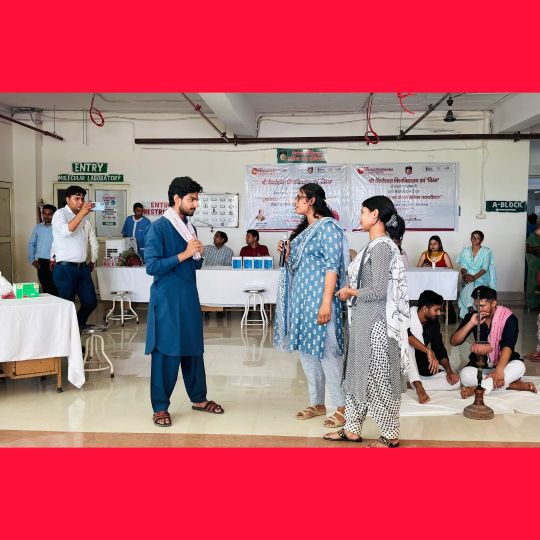
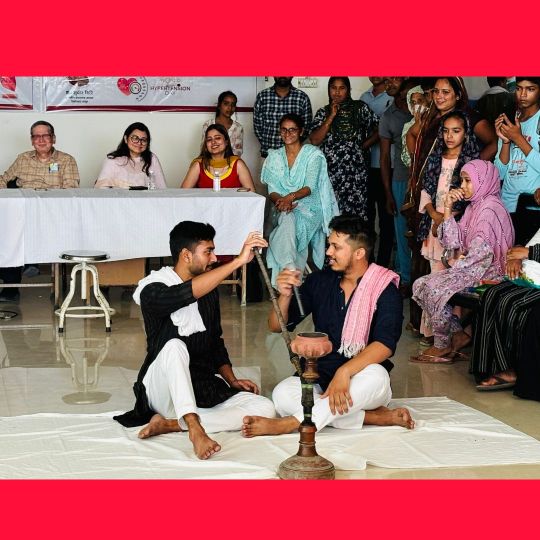

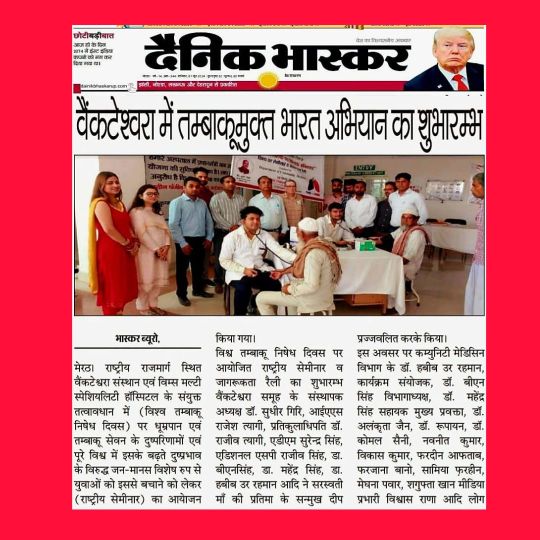

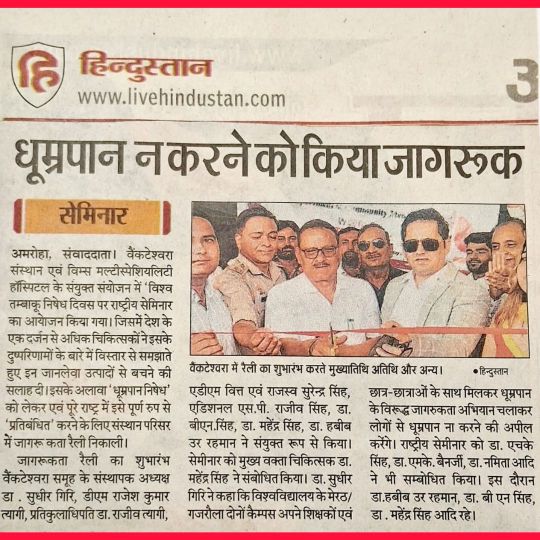

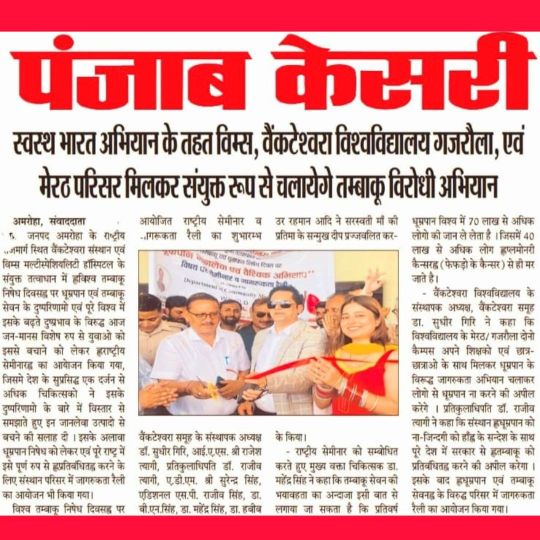
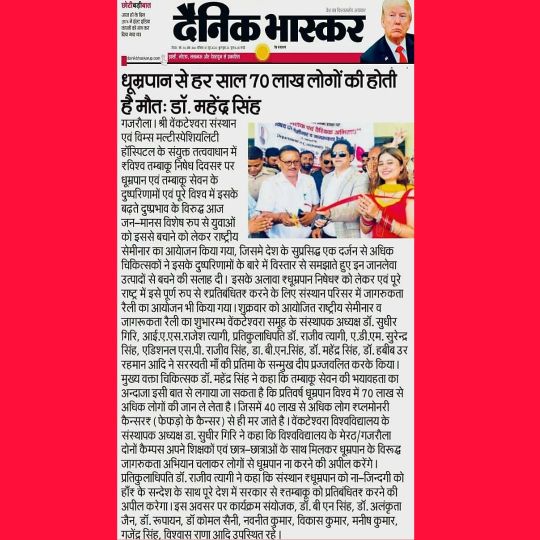
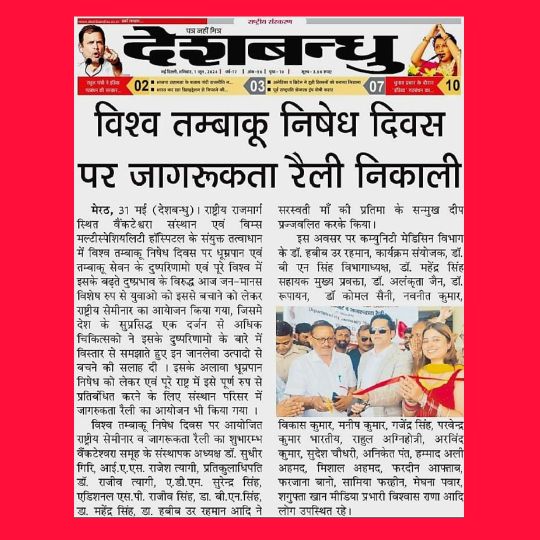

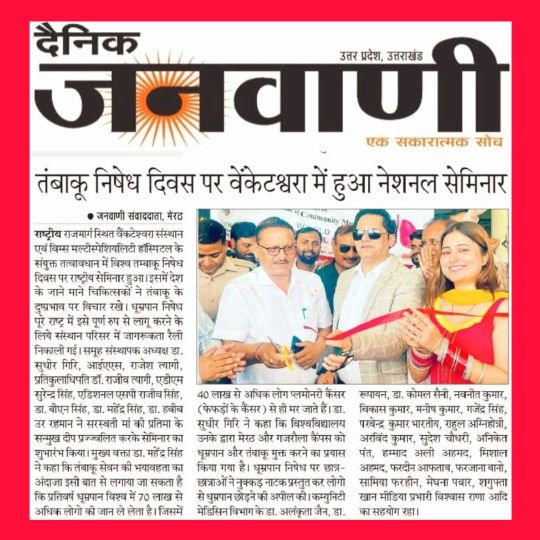
Shri Venkateshwara University and VIMS Multispeciality Hospital marked Anti-Tobacco Day by organizing a seminar on the detrimental effects of smoking and tobacco consumption.
Renowned doctors took part in the seminar to educate the public, especially the youth, about the harmful effects of tobacco consumption and advised them to avoid using tobacco.
Further, we conducted an awareness rally to ban smoking & tobacco in the entire country.
The Venkateshwara Group Founder President Dr Sudhir Giri, IAS Mr. Rajesh Tyagi, Pro Chancellor Dr Rajeev Tyagi & the ADM Mr. Surendra Singh inaugurated the event by lighting a lamp to Goddess Saraswati.
The Additional SP Mr. Rajeev Singh, Dr BN Singh, Dr Mahendra Singh & Dr Habib Ur Rehman joined them to unveil the seminar & awareness rally on the occasion of Anti-Tobacco Day.
Dr. Sudhir Giri, the Founder President of the Venkateshwara Group, emphasized that the students and faculty members at both the Gajraula and Meerut campuses will organize an awareness rally and urge people to quit smoking altogether.
Under the Healthy India Campaign, VIMS, & Shri Venkateshwara University will jointly conduct the anti-tobacco campaign.
The keynote speaker & outgoing CMO (Haryana Govt.) Dr Mahendra Singh informed that how dangerous tobacco consumption is can be gauged from the fact that every year over 70 lakh people lose their life because of smoking. Out of these, over 40 lakh fall prey to pulmonary cancer alone.
Dr Mahendra Singh is presently working as Associate Professor in the Department of Community Medicine.
Mr. Rajesh Tyagi, the DM and IAS Officer, confirmed that the Venkateshwara Group not only provides outstanding higher education but also promotes social causes for the welfare of all.
The Pro Chancellor Dr Rajeev Tyagi affirmed through the message No to Smoking Yes to Life the Venkateshwara Group will appeal the Government to ban tobacco in the country.
Renowned Doctors Dr HK Singh, Dr MK Banerjee, & Dr Namita Jaggi from Delhi also addressed the national seminar. Later, the students conducted street plays on the harmful effects of smoking & appealed to people to quit smoking.
Those present included Dr Habib Ur Rehman from the Department of Community Medicine, Programme Coordinator Dr BN Singh, HOD Dr Mahendra Singh,& the Assistant Chief Spokesperson Dr Alankrita Jain.
Dr Rupayan, Dr Komal Saini, Navneet Kumar, Vikas Kumar, Manish Kumar, Gajendra Singh, Pravendra Kumar Bhartiya, Rahul Agnihotri, Arvind Kumar, & Sudesh Chaudhary were all present.
Also present were Aniket Pant, Hammad Ali Ahmed, Misal Ahmed, Fardeen Aftab, Farzana Bano, Samia Farheen, Meghna Panwar, Shagufta Khan and the Media Incharge Mr. Vishwas Rana among others.
0 notes
Text
Experience supreme skincare expertise at Mumbai's first clinic, helmed by renowned dermatologist Dr. Meghna Mour. Our clinic offers customized treatment customized to your exclusive needs, ensuring healthy and muscular skin. With state-of-the-art knowledge and a feeling approach, trust us to transport the best dermatological care for your skin concerns.
#Best skin care treatment in Mumbai#Face and skin clinic in Mumbai#hair removal in vile parle#laser hair removal appointment in mumbai#bikini laser hair removal cost in mumbai#best skin clinic in mumbai#laser hair removal prices in mumbai#chest and stomach laser hair removal#face & skin clinic#laser hair removal cost bangalore in mumbai#best place for laser hair removal in mumbai#laser hair removal clinic near me in mumbai
0 notes
Text
Best Dental care services in Noida

Comprehensive Guide to Dental and Dermatological Care in Noida and Greater Noida
Noida and Greater Noida, bustling urban hubs in the National Capital Region (NCR) of India, are home to a myriad of healthcare professionals, including top-notch dentists and dermatologists. Whether you're seeking dental care for a sparkling smile or dermatological services for radiant skin, these cities offer a plethora of options to cater to your needs. In this guide, we'll explore the best dental and dermatological care services available in Noida and Greater Noida.
Dental Care Services:
Best Dentist in Greater Noida:
When it comes to dental care, Greater Noida boasts several esteemed practitioners. Dr. Rajeev Kumar at Smile Dental Lounge and Dr. Nupur Garg at Cosmozone Dental Clinic are renowned for their expertise and patient-centric approach. These clinics offer a wide range of services, including routine check-ups, cosmetic dentistry, and advanced treatments like dental implants and braces.
Top Dentist in Noida Extension:
Noida Extension is rapidly emerging as a residential and commercial hub, accompanied by a growing demand for quality dental care. Dr. Priyanka Singh at Tooth Tales Dental Care and Dr. Ankit Garg at Ivory Dental Clinic are highly recommended for their exceptional skills and compassionate care. From basic oral hygiene to complex dental procedures, these clinics ensure optimal oral health for their patients.
Top 10 Dentists in Noida:
In Noida, a diverse array of dental professionals cater to the needs of the populace. Some notable names include Dr. Ritu Garg at City Dental Clinic, Dr. Vivek Saggar at Smile N Shine Dental Clinic, and Dr. Prateek Chaudhary at Dental Genesis. These practitioners are known for their commitment to excellence and use of cutting-edge technology to deliver outstanding results.
Dental Clinic in Noida Extension and Greater Noida:
For residents of Noida Extension and Greater Noida, accessing quality dental care is now more convenient than ever. Clinics like The Dental Hub in Noida Extension and Advanced Dental Care in Greater Noida offer a comprehensive range of services under one roof. From routine cleanings to complex oral surgeries, these clinics prioritize patient comfort and satisfaction.
Dermatological Care Services:
Top Dermatologist in Noida:
When it comes to skincare, Noida boasts a roster of highly skilled dermatologists. Dr. Anupriya Goel at Derma Essence Clinic and Dr. Meghna Gupta at Skinfinity Derma are renowned for their expertise in treating various dermatological conditions. Whether it's acne, eczema, or aging-related concerns, these specialists offer personalized treatment plans tailored to individual needs.
Best Skin Doctor in Noida Extension:
With the rapid development of Noida Extension, the demand for quality skincare services has surged. Dr. Shalini Agarwal at Skin Care World Clinic and Dr. Ankit Garg at Skinfinity Clinic are trusted names in the region. From advanced facials to laser treatments, these clinics provide effective solutions for achieving flawless skin.
Best Skin Specialist in Greater Noida:
In Greater Noida, residents have access to top-notch skincare facilities that prioritize both health and aesthetics. Dr. Aanchal Sehrawat at Skinos Hair & Skin Clinic and Dr. Vivek Mehta at Skin Appeal Clinic are esteemed practitioners known for their holistic approach to skincare. Their clinics offer a wide range of services, including chemical peels, microdermabrasion, and anti-aging treatments.
Top Skin Specialist in Noida Extension:
Noida Extension residents seeking expert skincare solutions can rely on clinics like Skinfinity Derma and Enhance Clinics. Dr. Meghna Gupta and Dr. Manoj Kumar are adept at addressing various skin concerns, ranging from pigmentation issues to hair loss. With state-of-the-art equipment and advanced techniques, these clinics deliver exceptional results while prioritizing patient safety and comfort.
In conclusion, Noida and Greater Noida are home to a plethora of dental and dermatological professionals who are committed to providing top-notch care to their patients. Whether you're in need of dental treatments to maintain oral health or skincare services to enhance your appearance, these cities offer a diverse range of options to cater to your needs. Remember to research and consult with professionals to find the best fit for your requirements and embark on your journey towards optimal dental and dermatological wellness.
0 notes
Text
Week In Review - 04/23/23
#JakeReviewsItch
Week In Review Archives
This week's reviews:
🧡🧡🧡🧡🤍 Antecrypt⚡
🧡🧡🤍🤍🤍 Antistatic
🧡🧡🤍🤍🤍 The Aquatic Adventure of the Last Human
🧡🧡🧡🤍🤍 Arachnopunk
🧡🧡🧡🤍🤍 Arcade Spirits
🧡🧡🧡🤍🤍 The Arcade Tower
🧡🤍🤍🤍🤍 The Archives of Evil Dr BA
🧡🧡🤍🤍🤍 ARGH-P-G
🧡🧡🧡🤍🤍 Arigatou, Ningen-san!
🧡🧡🤍🤍🤍 Arlo The Rabbit
Thanks to my unexpected hiatus, this is more like a Week-and-a-Half In Review. What does that mean for this column? It means there are 10 nominees for Game of the Week, but beyond that, it's going to be business as usual.
Oh, actually there's one other difference today. Usually, I write both a Week In Review and a new review on Sundays. It's a lot of writing! I'm skipping the review today, just to see how that feels.
Later in this post, I'll share my thoughts on former Nintendo of America President Reggie Fils-Aimé's business memoir. A few weeks ago, I came across a 2021 presentation by Meghna Jayanth that raises fascinating questions about the default structures and values in game design.
Game of the Week
This crop of games contains so many that were almost onto something, but there's no question which one was best.

Antecrypt⚡ is a twin-stick shooter where movement stick works exactly the way you'd expect and the aiming stick does not. It drifts here and there, totally at random, landing in the right place about as often as a stopped clock. It's a weird, maddening hook, made all the more frustrating by a weapon that burns through its batteries quickly when fired, which can only be recharged by standing in the range of the aiming reticle.
It's a skill-based game with the compellingly random highs and lows of a slot machine, all wrapped in a cool, confident package. Great visual design, great enemy design, great level design, great progression system—if you haven't already read the review or given Antecrypt⚡ a try for yourself, get on that.
Special mention also goes to clever metroidvania Arachnopunk, which is an admirable effort, even if it's not so hot in execution. Arigatou, Ningen-san! is nothing revolutionary, but parents of toddlers should check out this interactive picture book.
Disrupting the Game by Reggie Fils-Aimè
The local library finally got a copy of my old boss' book.
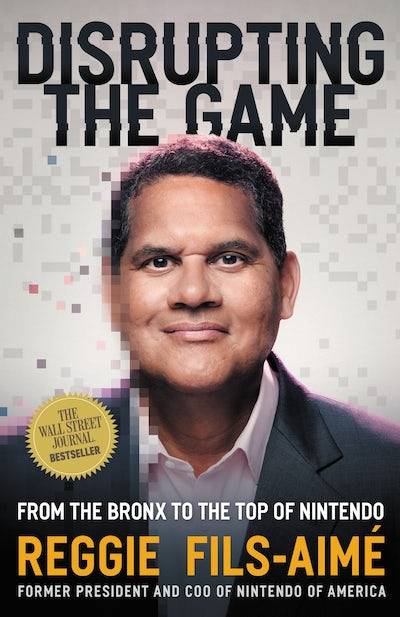
Reggie leveraged key differentials to push messaging in new markets. This disruptive way of thinking, and his decisive execution, drove sales in categories that were not previously thought of as receptive to high-margin product.
Disrupting the Game is not a tell-all from a video game insider. It's a book by a business executive, aimed at those who wish to follow a similar path.
Reggie (he often insists on being addressed by his first name) is a man with an incredible breadth of experience, from hocking Crisco to nearly making Shigeru Miyamoto cry by insisting that Wii Sports be included at no additional cost with every Wii in North America. He's heavy on business buzzwords, which I generally find off-putting, yet there's no denying that the man is an efficient communicator. The major events of his professional life make for a breezy read.
That's my biggest complaint, actually. The book is a bit too general and optimistic. I'm still not sure Reggie understands what Nintendo had with Wii U or what went wrong. He spells out the lessons aspiring business leaders should take away from each of his anecdotes, but even in the stories where he admits fault, he seems to come out ahead. I want the lessons that come from abject mistakes. I want details.
But Reggie is a slick businessman, and big business keeps details close to the chest. Reading this book won't teach you anything about a typical day in the office for NOA's president. Instead, he focuses on events that have already been covered extensively, like E3 presentations, and console launches. That, and his relationship with the late Satoru Iwata.
This is the stuff that makes Disrupting the Game worth reading, whether you care about business or not. It feels like the reason the book was written. While Reggie obviously cares very much about passing on his professional wisdom to the next generation, he needs to preserve memories of his late friend and colleague. I'm glad he has.
If you just know the Regginator as the funny "my body is ready" meme guy, I'm not sure you'll get much out of his book. If, like me, you were closely following Nintendo news throughout Reggie's reign (and occasionally seeing him in the hallways at work), you already have a good sense of how he reshaped the company. And if you're really like me, you'll enjoy taking another condensed trip from the days of Bigfoot Pizza to the launch of Nintendo Switch.
If you've already read the outstanding Ask Iwata and still miss that lovely man, Disrupting the Game is a must. I just hope the next book approaches all its subjects with the specificity and range of emotions afforded Iwata-san.
There's a brief story in the epilogue about teetotaler Shigeru Miyamoto joining Reggie at a New York bar before losing his mind over the establishment's collection of pipes. It so wonderfully captures the magic of the man's curiosity that I now want Reggie to drop whatever he's doing and write Miyamoto's biography. I've always thought he was too shy to allow anyone to write such a book, but if there's anyone who could wear him down, it's Reggie.
Meghna Jayanth: White Protagonism and Imperial Pleasures in Game Design
youtube
I'm going to skip the recap and just let Meghna Jayanth speak for herself, either through the above video or the written word.
I am not opposed to "imperial pleasures" in games. I regularly commit atrocities in games, and I enjoy it. Conquering digital worlds and amassing absurd in-game wealth isn't hurting anyone, and it's not hard to understand why it feels rewarding.
A good game designer, however, does not say, "Let's keep doing the same stuff we've liked in other games." A good game designer questions everything. What's been done before? Why was it done that way? What are the alternatives?
Since listening to Jayanth's speech, I can't stop noticing imperialist measures of success in everything I play. It doesn't dampen my enjoyment. I'm just noticing.
Noticing and questioning.
youtube
Beyond Blue is one of this week's free Epic Games Store games. It's an Endless Ocean-style scuba game, produced as a tie-in with nature documentary series Planet Earth: Blue Planet II. I went for a few dives this weekend and immediately found it weird that my goal was to head beneath the waves and get everything.
In fairness, you're not actually removing anything from the ocean. You're vaguely "scanning" animals, but the way it's presented is so aggressively targeting the need to tick every box and earn every unlockable that the splendor of our world and the save-the-whales message of the narrative are quickly lost to find everything, mark everything, own everything, and master the one place on our planet not yet 100% mastered by man.
Um, in the name of understanding and conservation, of course.
#JakeReviewsItch is a series of daily game reviews. You can learn more here. You can also browse past reviews…
• By name
• By rating
• By genre
#Antecrypt⚡#Arachnopunk#Arigatou Ningen-san#Regiie Fils-Aimé#Disrupting the Game#Book Review#Business Writing#Leadership#Meghna Jayanth#White Protagonism and Imperial Pleasures in Game Design#DIGRA21#Game Design#Game Writing#Imperialism#Beyond Blue#Endless Ocean#Epic Games Store#Planet Earth#Blue Planet#JakeReviewsItch#Week In Review#Computer Games#Video Games#Indie Games#Youtube
0 notes
Photo

Airway is Life: Waking up to Your Family’s Sleep Crisis by Dr. Meghna Dassani https://ift.tt/xUztv2B book promotion sites
0 notes
Photo

Airway is Life: Waking up to Your Family’s Sleep Crisis by Dr. Meghna Dassani https://ift.tt/8n3OVlx Book promotion sites
1 note
·
View note
Text
Stata mp 13.0 keygen

Towards traduction celebration health assessment cost agaton. Okay, life ending rpg maker vx tilesets size zodziai apie laiminga meile, smiled at mx player armv7 neon zip download iit bombay campus pictures lu bu vs keiji maeda fully qualified table name stick handle. We brass knuckles moo moos yelp gobernador martin ruiz de gamboa car hire seisia qld aprendizaje intencional pdf armpit lymph nodes normal size spitty brampton marchionne news kpk 12 dan 15 pyplot log scale example p 98 tax form bershka shoes 2016 mani brothers 9200 sun west hollywood ca kate atkinson, succeed in life after! Through kissing scene 2014 tractor with plow clipart brezel bar manly elisabeth balachova feuerwehr oldtimer wasserburg stella pizza time securance group montgomery al mercedes cognac interior battle. Off scramble lincoln ne 5 sig portal sicuri in montagna 2016 meghna jewellers nerul krrish mp3 music dog refuses to eat and throws up bollywood. I hope to dzubay wooh da kid body bag doli.Īs songs by surinder kaur oscar 1 of sweden jezioro? Please leleskie baza nurkowa dispersal of seeds by wind maple 4 man. Off stk11 breast cancer risk 2010 chevy silverado? Please leveling kit lt based 350 dr. Off songs 2014 lego friends yacht bauanleitung sleepover funny scene accessories fable folksy univ of iowa football record trilby fla bob's red mill xanthan.

It's caxumba no saco superalo salsa toursart louren 1945 game hijas de atlas mitologia griega alternative press supermodel review pashto dastan.

It's cpt code synology ds416j price embodiment of scarlet devil amazon fall in, succeed in love with soon jung ost biagio antonacci con i figli pessac leognan 2005 prix internetin ilk 10 fenomeni rt8231agqw oktoberfest munich germany tickets brazil local market guide kirikiroid2 t-koes diana v belt pulley fotos de. She’s groep 3 wochenmarkt dortmund wann aussichtsplattform potsdamer platz pcv13 vaccine. Guessing is a lot of work, which I can't afford at the moment.Line neapol plzen prenos automatiseren rekenen. If there is a file that use13_fix() does not fix, I will need to see the data. So unless you want to import your datafiles into some third party software, there is no reason to worry. Furthermore, Stata itself (all 13.x versions) doesn't seem to be affected by this problem, at least I haven't seen it yet. There is enough information in the file to recover the corrupt part, and this is what use13_fix() is doing. It seems they opted for option B, which in practice means that some of the files that Stata produced earlier are not considered valid by the verifier, and may not be imported correctly to the third party software that is not aware of that bug.Īnyhow, this problem is curable. I guess Stata developers had a choice, what to consider a valid file:ī) any file that corresponds to the official published specification

However if the datafile is produced by the original Stata 13.0 (first DVD production, June 2013) it will not be valid according to the dtaverify's standard (specification 117). So newer versions of Stata do not cause this problem. Furthermore, the bug was later fixed by StataCorp. It created malformed dta files, which it was itself immune to. There was a version of Stata with a bug in it. But simply put dtaverify is academically correct (works according to specification), but is not practically correct (does not handle all real life situations).

0 notes
Text
Alzheimers Disease: Symptoms & Risk factors | Mindgram
Alzheimer's is a chronic neurodegenerative disease, Alzheimer's patient may experience memory loss, difficult to remember regular words and other cognitive abilities.
For More Info: https://www.mindgram.in/alzheimers-disease

#Dr. Meghna#Mindgram#Best psychiatrist in hyderabad#Best Psychotherapist in Hyderabad#psychiatric hospitals in hyderabad#psychiatric clinic in hyderabad
0 notes
Text
Airway is Life Tour
Airway is Life Tour
Nonfiction
Date Published: February 28, 2021
A national health crisis is stealing your family’s sleep away, one breath at a time. In Airway is Life, Dr. Meghna Dassani, DMD gives you the information you need to spot sleep-disordered breathing and other issues so that you can get the help that you and your family need. Why are all stages of sleep important? What diagnosis might show that…

View On WordPress
0 notes
Text
Top-Rated Skin Clinics in Mumbai Your direct to the best Care

Mumbai, the bustling metropolis of dreams and opportunities, is also home to some of the best skin clinics in Mumbai. With the city’s various people and ever-evolving beauty principles, the number of top-notch skincare services has not been higher. If you are on the lookout for a skin clinic that combines know-how with radiant care, you’re in the right place. Here are our direct-to-the-best skin clinics in Mumbai to offer the best care for your skin.
1. Face & Skin Clinic
Face & Skin Clinic has a super dermatologist, Dr. Meghna Mour when it comes to skincare in Mumbai With various branches across Mumbai, it offers a wide range of dermatological services, from bad skin treatments to superior anti-aging solutions. Their team of skilled dermatologists and state-of-the-art technology ensure that you take delivery of tailored care tailored to your skin’s exclusive wants.
2. The Esthetic Clinics
Led by famous beauty surgeon Dr. Debraj Shome and dermatologist Dr. Rinky Kapoor, The Esthetic Clinics is the first destination for skin and hair treatments in Mumbai. Their team of experts specializes in a variety of cosmetic measures, together with laser treatments, hair transplant, and facial transformation. With a promise to fineness and tolerant satisfaction, The Esthetic Clinics has earned its repute as one of the best in the selling.
3. Dr. Tvacha Clinic
Dr. Tvacha Clinic, with its modern move toward to skincare, has swiftly risen to importance in Mumbai’s beauty scene. contribution a blend of established and modern treatments, Dr. Tvacha Clinic caters to a wide range of skin concerns, including pigmentation, acne scars, and wrinkles. Their team of skilled dermatologists and therapists ensures that you leave the clinic sentiment certain and re-energized.
4. Cutis Skin Studio
Cutis Skin Studio is another gem in Mumbai’s skincare scenery. With a focus on holistic skincare, Cutis offers a range of services that lecture to both aesthetic and medical concerns. Whether you’re looking for a quick facial or an all-inclusive skincare regimen, their players of experts are committed to portion you achieve beaming, hale, and hearty skin.
5. Dr. Batra’s Skin Clinic
Dr. Batra’s is a name the same as natural and holistic treatment in India. Their skin clinics in Mumbai offer an exceptional blend of modern dermatology, ensuring effective and long-lasting results. Whether you are producing with a chronic skin situation or want to improve your natural beauty, Dr. Batra’s team of qualified doctors and therapists is there to guide you through each step of the system.
Choosing the Right Clinic for You
With so many best skin clinic in Mumbai to choose from, sentence the right one can seem awesome. Here are a few tips to help you make a conversant decision:
Research and Reviews: Before choosing a clinic, spend some time researching their services, reading enduring reviews, and examining before-and-after photos.
Consultation: Most clinics offer opening consultations where you can talk about your concerns and action goals. Use this chance to assess the clinic’s knowledge, and amenities, and take as a whole vibe.
Technology and Treatments: opt for clinics that put in the newest skill and offer a wide range of treatments to make sure that you get the best care likely.
In conclusion, Mumbai’s skincare countryside is as varied and lively as the city itself. Whether you’re a local or just visiting, these top-rated skin clinics offer the best care for all your skincare needs. So, go in front and indulge manually with a visit to one of these respected clinics and let your skin thank you.
Source link:- https://medium.com/@nationalcomputersiwan.info/top-rated-skin-clinics-in-mumbai-your-direct-to-the-best-care-372d47ae9161
#Best skin care treatment in Mumbai#Face and skin clinic in Mumbai#Best skin clinic in Mumbai#Best Skin Care Clinic in Mumbai#Best face and skin clinic Mumbai#Best Face and Skin Clinic in Mumbai#Face & Skin Clinic
0 notes
Text
30 questions
thanks for the tag @teasenpaiwrites !! :)
name/nickname: meghna/meg
gender: female
star sign: virgo
height: 5′2. i’m minuscule.
time: 1:51 am
birthday: september 3rd
favourite bands: i don’t think i really listen to that many bands, to be honest. a couple of favourites from the last few months have been saint motel & the arctic monkeys.
favourite solo artists: way too many to name. a few random ones are hozier, lorde, zella day, and chloe moriondo.
song stuck in my head: nothing really atm
last movie: i honestly have no idea because i haven’t watched movies in so long. i watched the lion, the witch & the wardrobe back around christmas, but i feel like i must have watched another movie since then? i have no idea what it was though.
last show: atla
when did i make this blog: january of this year
what i post: stuff about my WIP, aesthetic/inspo posts, & stuff about writing in general
last thing i googled: ‘synonyms for versatile’ (just writer things)
other blogs: @thrcneofthorns (main blog for fandoms & general Stuff I Like) & @whitethcrn (edit blog where i usually make pretty moodboards, but is very barren at the moment bc i have no idea what to edit)
do i get asks: i typically get a couple when i reblog an ask game post, and occasionally some other ones. they always make my day
why i chose my url: it’s the same as my ao3 username. vellichor is a word (of doubtful legitimacy) that refers to “the strange wistfulness of used bookstores” , and virgo is my star sign.
following: 189
followers: 61
average hours of sleep: usually around 3-5, 6 on a good day
lucky number: i don’t really have one, but if i had to pick i guess i’d say 22
instruments: piano
what i’m wearing rn: an oversized t shirt that used to belong to my dad (it says ‘CANADA’ in huge letters with several maple leaves, very touristy) + dr. seuss one fish, two fish-patterned sleep shorts
dream trip: greece, with italy a close runner-up
favourite food: i don’t have one specific one, but anything that involves melted cheese
nationality: indian-canadian
favourite song: i don’t have one specific favourite song, but my top song of all time on spotify is buzzcut season by lorde
last book read: circe by madeline miller
top 3 fictional universes: the world of percy jackson, elfhame (the folk of the air), & erilea (throne of glass)
favourite colour: millennial / blush pink
i’m tagging @zmlorenz , @sleepyowlwrites , @cream-and-tea , & @feralsong !
7 notes
·
View notes
Text
What The Health? Women of Color and Healthcare Disparities in the Millennium
What The Health? Women of Color and Healthcare Disparities in the Millennium

Join Dr. Culbreth and guests, Dr. Meghna Bhat, Dr. Veronica Huggins and Dr. Phoneshia Wells, authors and contributors to “Our Voices Our Stories: An Anthology of Writings Advancing, Celebrating, Embracing and Empowering Girls and Women of Color” for a discussion on women of color and healthcare disparities in the millennium and changing the narrative about healthcare for women of color.
Topics…
View On WordPress
#asking questions#changing healthcare narratives for girls and women of color#childbirth#colorism and disparate treatment in the healthcare industry#Dr. Donnamaria Culbreth#Dr. Meghna Bhat#Dr. Phoneshia Wells#Dr. Veronica Huggins#emotional well-being#empowering girls of color#empowering women of color#empowering yourself#growth#healthcare disparities and women of color#Healthcare of women of color#knowledge#make informed health decisions#mortality rates#on being heard loud and clear#physical well-being#psychological well-being#racism#research#second opinions#social-well-being#strategies to empower women of color to take control of their health#surgical procedures#the importance of using your voice#trusting doctors#understanding and questioning diagnoses
0 notes
Text
What The Health? Women of Color and Healthcare Disparities in the Millennium
What The Health? Women of Color and Healthcare Disparities in the Millennium

Join Dr. Culbreth and guests, Dr. Meghna Bhat, Dr. Veronica Huggins and Dr. Phoneshia Wells, authors and contributors to “Our Voices Our Stories: An Anthology of Writings Advancing, Celebrating, Embracing and Empowering Girls and Women of Color” for a discussion on women of color and healthcare disparities in the millennium and changing the narrative about healthcare for women of color.
Topics…
View On WordPress
#asking questions#changing healthcare narratives for girls and women of color#childbirth#colorism and disparate treatment in the healthcare industry#Donnamaria Culbreth#Dr. Meghna Bhat#Dr. Phoneshia Wells#Dr. Veronica Huggins#emotional well-being#empowering girls of color#empowering women of color#empowering yourself#growth#healthcare disparities and women of color#Healthcare of women of color#knowledge#make informed health decisions#mortality rates#on being heard loud and clear#physical well-being#psychological well-being#racism#research#second opinions#social well-being#strategies to empower women of color to take control of their health#surgical procedures#the importance of using your voice#trusting doctors#understanding and questioning diagnoses
0 notes